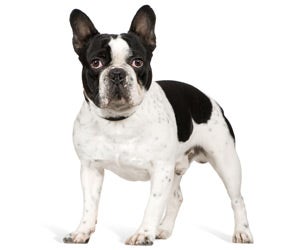French Bulldog
-
Overview
These little lap dogs prefer to spend their time eating treats and snoozing at their owner's feet, but be careful not to over-indulge them. French Bulldogs should not weigh more than 28 pounds, or they have a hard time supporting their top-heavy build. These little dogs were bred strictly for companionship, so don't expect these little guys to take much interest in other activities like guarding the house or going for a jog.
French Bulldogs love to go on errands and live in apartments. They are not demanding, which makes them great pets for first-time owners and young city-dwellers. Laid back French Bulldogs are adaptable, amusing companions for owners who are looking for affectionate companions to stay close to their sides and entertain them.
-
Personality
Frenchies are clever and mischievous. As much as they love to play, they aren't going to over-exert themselves. It's not too easy to convince these pampered pooches to do something they don't want to do, so training them can prove to be a challenge. They do enjoy working for rewards, whether it's a treat or a belly rub, so training should focus on positive motivation and fun. These dogs also know their limits. Because they are brachycephalic, their breathing is labored and sometimes wheezy, and they become uncomfortable in hot weather. As a result, they prefer indoor play.
Because these dogs often snort or wheeze as they move, they give the appearance of working hard to please their owners. It's true — they love to spend time with people. They are primarily human companions, although they can get along with other dogs, especially if they're socialized from a young age. Many French Bulldogs seem to take more interest in humans than in people, but that is mainly because they love to be the center of attention.
-
Coat Care
The French Bulldog's coat comes in a wide variety of colors. Depending on their size, it is sometimes possible to mistake French Bulldogs for Pugs or Boston Terriers, but Frenchies can be distinguished by their stout chests and their top-heavy, labored movement. French Bulldogs are most frequently seen in shades of brindle, fawn, black and white, in either solid colors or combinations of two. Their coat is short and close-fitting. The moderately fine hair is smooth to the touch, but slightly bristly when it sheds.

Although your Frenchie will expect plenty of belly rubs, he will not require much grooming. Rub their coats with a rubber brush to remove dead hair and keep it shiny.
Make sure that the extra skin around your French Bulldog's little pushed-in face stays clean and dry, because this area is prone to infection.
Trimming around the ears, rump and toes can help your French Bulldog stay comfortable, but the coat does not tend to grow long.
Frenchies are not active dogs, so they will need to have their nails trimmed about once a month to stay comfortable and clean.
Not all breeds and coat styles require routine trimming in and around the eyes and ears but all should undergo regular inspection and cleaning around these sensitive areas. Doing so will help prevent the development of infections that could seriously damage these amazing organs.
It is always important to routinely clean your dog's eyes and ears, and examine for potential infections. Some smooth-coated dogs, like Basenjis and Boxers, and dogs with large ears, like Weimaraners and Great Danes, have sensitive ears that should be checked weekly for infection and cleaned with a cotton ball. Gently wipe a cotton ball moistened with mineral oil, olive oil or witch hazel in your dog's ear, being careful to avoid the ear canal. Never use a Q-Tip, which could cause damage to the inner ear if your dog suddenly shakes or jerks his head. Bushy hair growth within the ear can be thinned with tweezers or blunt scissors. Use a small trimmer to trim excess hair around the eyes, ears and face. If you have a small dog, like an Italian Greyhound, take special care to clean around their eyes with a cotton ball or soft cloth and use a small trimmer to trim excess hair around their eyes to make sure they are comfortable. Dogs with facial wrinkles, like French Bulldogs and Boston Terriers, should have their faces wiped down at least weekly to prevent infection.
Many owners do not realize how important it is to brush your pet’s teeth on a regular basis. Some dogs are prone to dental problems and sensitive teeth, especially small dogs with tiny teeth and dogs with special diets. These problems can be easily combatted with frequent brushing.
Cavities are rare with dogs but gum disease caused by tartar buildup is not, which is why they require regular brushing with toothpaste and a toothbrush formulated specifically for dogs. While daily brushing is ideal, doing so on a weekly basis will be a big help in avoiding the need to bring your dog to a veterinarian for a cleaning, which usually has to be done under sedation.

 India (English)
India (English)
 Middle East and Africa (English)
Middle East and Africa (English)
 South Africa (English)
South Africa (English)
 Australia (English)
Australia (English)
 Japan (日本語)
Japan (日本語)
 South East Asia (English)
South East Asia (English)
 Singapore (English)
Singapore (English)
 Europe (English)
Europe (English)
 United Kingdom (English)
United Kingdom (English)
 Argentina (Español)
Argentina (Español)
 Brazil (Portuguese)
Brazil (Portuguese)
 Colombia (Español)
Colombia (Español)
 Latin America (Español)
Latin America (Español)
 México (Español)
México (Español)
 Chile (Español)
Chile (Español)
 Peru (Español)
Peru (Español)
 Canada (English)
Canada (English)

